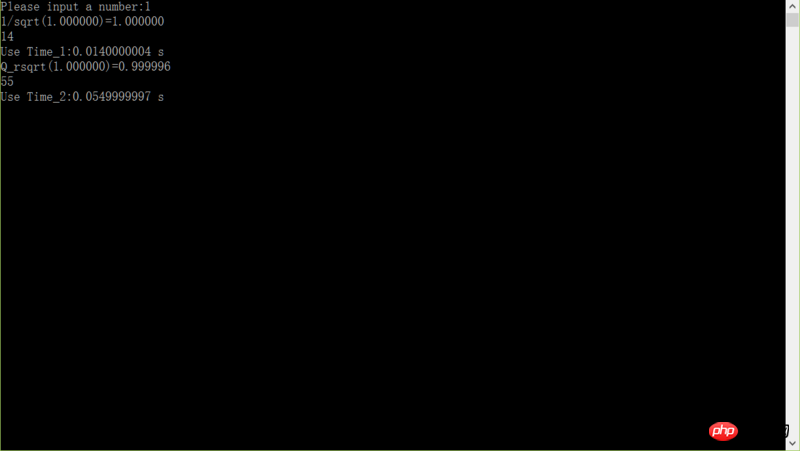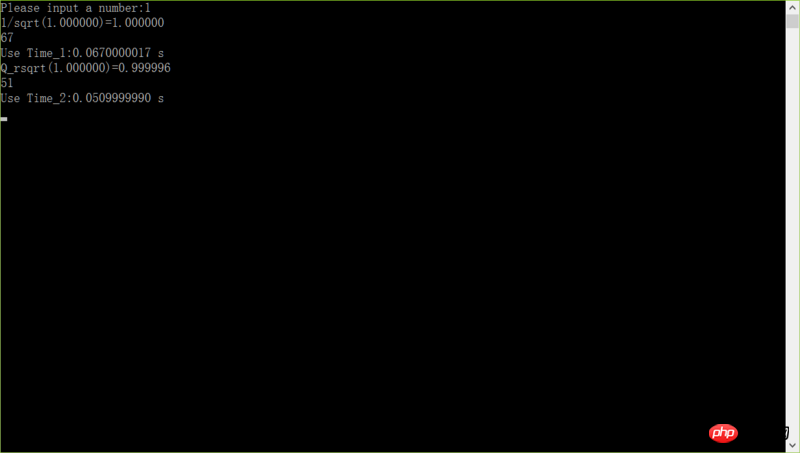问题源于这样一道作业题:
作业中提到的的那个invSqrt的代码如下:
float Q_rsqrt( float number )
{
long i;
float x2, y;
const float threehalfs = 1.5F;
x2 = number * 0.5F;
y = number;
i = * ( long * ) &y; // evil floating point bit level hacking
i = 0x5f3759df - ( i >> 1 ); // what the fuck?
y = * ( float * ) &i;
y = y * ( threehalfs - ( x2 * y * y ) ); // 1st iteration
// y = y * ( threehalfs - ( x2 * y * y ) ); // 2nd iteration, this can be removed
return y;
}
然后就自己写了个比较性能和精度的程序:
#include<stdio.h>
#include<math.h>
#include<time.h>
float Q_rsqrt(float number) //从wiki上获取的源代码
{
long i;
float x2, y;
const float threehalfs = 1.5F;
x2 = number * 0.5F;
y = number;
i = *(long *)&y; // evil floating point bit level hacking
i = 0x5f3759df - (i >> 1); // what the fuck?
y = *(float *)&i;
y = y * (threehalfs - (x2 * y * y)); // 1st iteration
y = y * (threehalfs - (x2 * y * y)); // 2nd iteration, this can be removed
return y;
}
int main()
{
int LoopCount = 1000000; //循环计算次数
float dur = 0; //时间间隔,初始化为0
float x; //待计算数
printf("Please input a number:"); //输入提示
scanf_s("%f", &x, sizeof(float));
float y;
clock_t t1 = clock();
for (int i = 0; i < LoopCount; i++) {
y =(float)( 1 / sqrt(x));
}
t1 = clock() - t1;
printf("1/sqrt(%f)=%f\n", x, y);
printf("%ld\n", t1);
printf("Use Time_1:%.10f s\n", ((float)t1 / CLOCKS_PER_SEC));
float z;
clock_t t2 = clock();
for (int j = 0; j < LoopCount; j++) {
z = Q_rsqrt(x);
}
t2 = clock() - t2;
printf("Q_rsqrt(%f)=%f\n", x, z);
printf("%ld\n", t2);
printf("Use Time_2:%.10f s\n", ((float)t2 / CLOCKS_PER_SEC));
getchar();
getchar();
return 0;
}
之后,出现了一个很奇怪的问题:

是的。。。C中的库函数效率基本上是下面那个算法的4倍!!!
但是,如果用C++中的库函数:
#include<stdio.h>
#include<cmath>
#include<time.h>
float Q_rsqrt(float number) //从wiki上获取的源代码
{
long i;
float x2, y;
const float threehalfs = 1.5F;
x2 = number * 0.5F;
y = number;
i = *(long *)&y; // evil floating point bit level hacking
i = 0x5f3759df - (i >> 1); // what the fuck?
y = *(float *)&i;
y = y * (threehalfs - (x2 * y * y)); // 1st iteration
y = y * (threehalfs - (x2 * y * y)); // 2nd iteration, this can be removed
return y;
}
int main()
{
int LoopCount = 1000000; //循环计算次数
float dur = 0; //时间间隔,初始化为0
float x; //待计算数
printf("Please input a number:"); //输入提示
scanf_s("%f", &x, sizeof(float));
float y;
clock_t t1 = clock();
for (int i = 0; i < LoopCount; i++) {
y =( 1 / sqrt(x));
}
t1 = clock() - t1;
printf("1/sqrt(%f)=%f\n", x, y);
printf("%ld\n", t1);
printf("Use Time_1:%.10f s\n", ((float)t1 / CLOCKS_PER_SEC));
float z;
clock_t t2 = clock();
for (int j = 0; j < LoopCount; j++) {
z = Q_rsqrt(x);
}
t2 = clock() - t2;
printf("Q_rsqrt(%f)=%f\n", x, z);
printf("%ld\n", t2);
printf("Use Time_2:%.10f s\n", ((float)t2 / CLOCKS_PER_SEC));
getchar();
getchar();
return 0;
}
然后跑出来的结果是这样的:

因此。。。似乎C的效率比C++高了很多很多?现在在VS2015中的实现就连那个神奇的快速算法也比不过了?(还是。。。我这样的比较是不对的。。。)
疑惑中。。。
凡是涉及到效率比较的问题,首先要确定的几个前提条件是:
是否使用了同样的编译器
是否使用了同样编译开关(比如优化开的是O几)
是否在同样的环境配置下运行的
运行的结果是否精确定量可重复
在以上条件都确定以后,才能确认结果的可靠性,然后再考虑结果产生的原因。
不知道题主的问题是否考虑了上述前提条件。
题目中只测试了两个算法在同一个 case 下的结果,也许这个 case 对于一个算法是最优情况、对另一个算法是最差情况,所以结果不能说明问题。例如对于一个一般情况下是O(n log n)复杂度的算法,有可能最坏情况是O(n^2)、最优情况是O(n)。不能仅凭一个 case 就说明某个算法的优劣。
补充一下@jaege 的答案。你只算了两个数值,这样很难说明情况。要比较的话至少多跑一些数值,比如几万个数值,然后再比较。